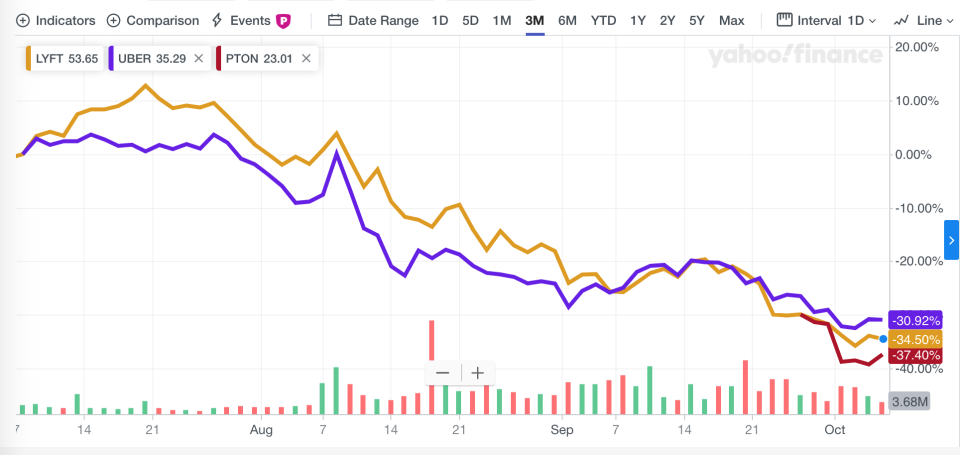Airbnb has the chance to avoid the legal mistakes of Uber, Lyft, and Peloton
Airbnb has a $31 billion valuation and plans to go public next year.
It also has active regulatory disputes over taxes and rental rules with a slew of city governments, most notably New York.
In February, New York City subpoenaed Airbnb for data and addresses of New Yorkers who are listing their properties as short-term rentals on the site. Mayor Bill de Blasio has led the charge, saying back in February that the city “won’t let bad actors” turn apartment buildings into “illegal hotels for tourists.” It was the latest salvo in a stretch of legal disputes between Airbnb and New York that has lasted almost a decade.
And now, according to Bloomberg, Airbnb’s biggest backers are “growing more nervous” about the situation in New York. They want the “decacorn” to wait to go public until it has handled its problem in New York.
Airbnb is unlikely to do that (once these tech unicorns announce their intention to go public they are typically in a hurry – see WeWork), but it should. The company’s leadership ought to take a look at Peloton, Uber, and Lyft— all of which went public with lingering regulatory issues— and avoid the same fate.

Peloton (PTON) faces a $350 million lawsuit from music groups for using unlicensed songs in its classes. The company disclosed music rights as a risk in its S-1 filing in August, but the lawsuit, first filed in March, got even more expensive in September, days before the Peloton IPO, when the plaintiff discovered even more songs Peloton used without paying. It is a legal problem the hot fitness bike-maker foresaw and arguably should have handled before hitting the market. Peloton is down 15% from its IPO debut price.
Uber (UBER) went public in May after a long parade of executive departures, and weighed down with a laundry list of legal risks. Like Airbnb, Uber continues to grapple with regulators in a slew of regions around the world, but has its toughest fight right now in one specific bellwether area: California. The state passed a landmark bill last month to recognize gig economy workers as employees, not contractors. Uber has pushed back and argued it does not have to comply, for a list of reasons including the claim that drivers are not core to its business. Now Uber is facing new lawsuits over its refusal to comply. Uber is down 29% since its IPO.
Lyft (LYFT) faces basically the same legal hurdles as Uber in terms of whether to classify its drivers as full-time employees. It is the same financial and public relations risk these companies have faced since their inception. (If they have to start giving all drivers full-time benefits, margins will decrease and it will take them even longer to become profitable.) But Lyft also faces multiple lawsuits from women alleging sexual harassment or assault in Lyft cars, and the company has had to implement new safety measures in response. Lyft is down 55% since its IPO.

Considering all of this, Airbnb has the chance to pump the brakes and wait as long as it takes to handle its legal issues in New York before going public. That would almost certainly pave the way for a more successful IPO. And considering that in this case it is reportedly Airbnb’s investors who want it to wait, the company does not have to worry about mounting pressure from its backers to deliver their exit. (It also already has a significant financial advantage Uber, Lyft, and Peloton didn’t: Airbnb was profitable in 2018.) It could wait longer. And yet, patience and prudence have not typically characterized Silicon Valley unicorn tech names over the past couple of years.
On Sept. 19, Airbnb put out a statement to reiterate that it will go public in 2020.
—
Daniel Roberts is a senior writer and show host at Yahoo Finance. Follow him on Twitter at @readDanwrite.
What really caused the unicorn IPO funeral
Uber, Lyft stock performance shows 'appetite for risk has diminished'
Netflix stock is vulnerable in a recession, Nomura says
Meet the ‘phoenix’ stocks: Zoom, MongoDB, PagerDuty and more
Read the latest financial and business news from Yahoo Finance
Follow Yahoo Finance on Twitter, Facebook, Instagram, Flipboard, LinkedIn, YouTube, and reddit.

 Yahoo Finance
Yahoo Finance 
